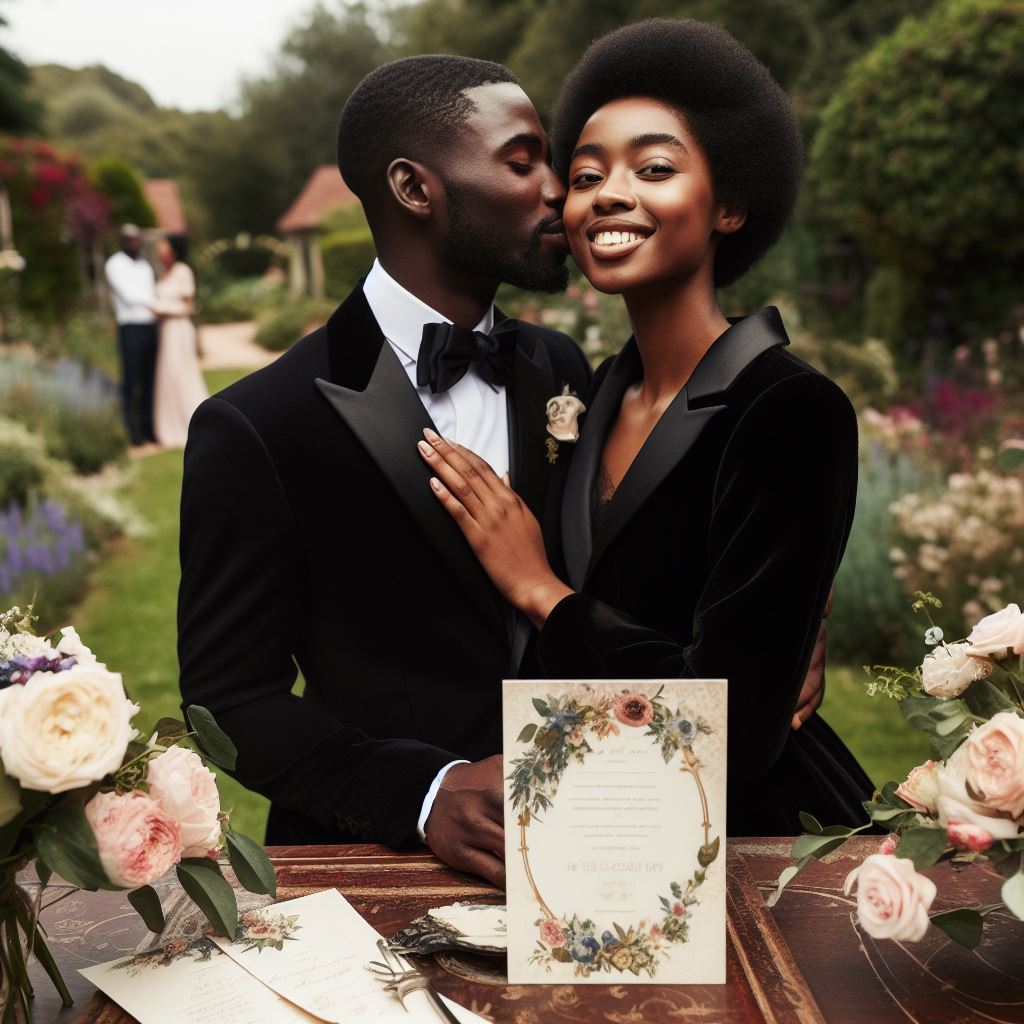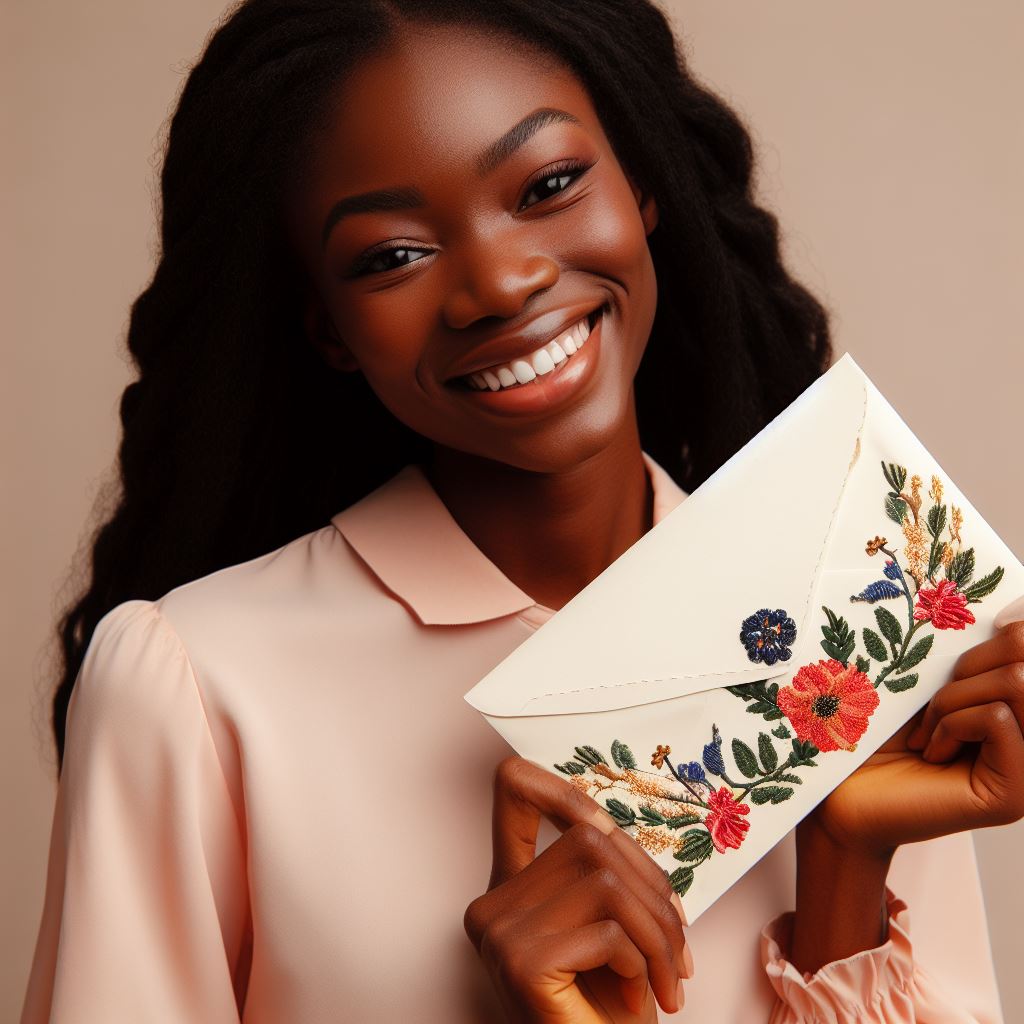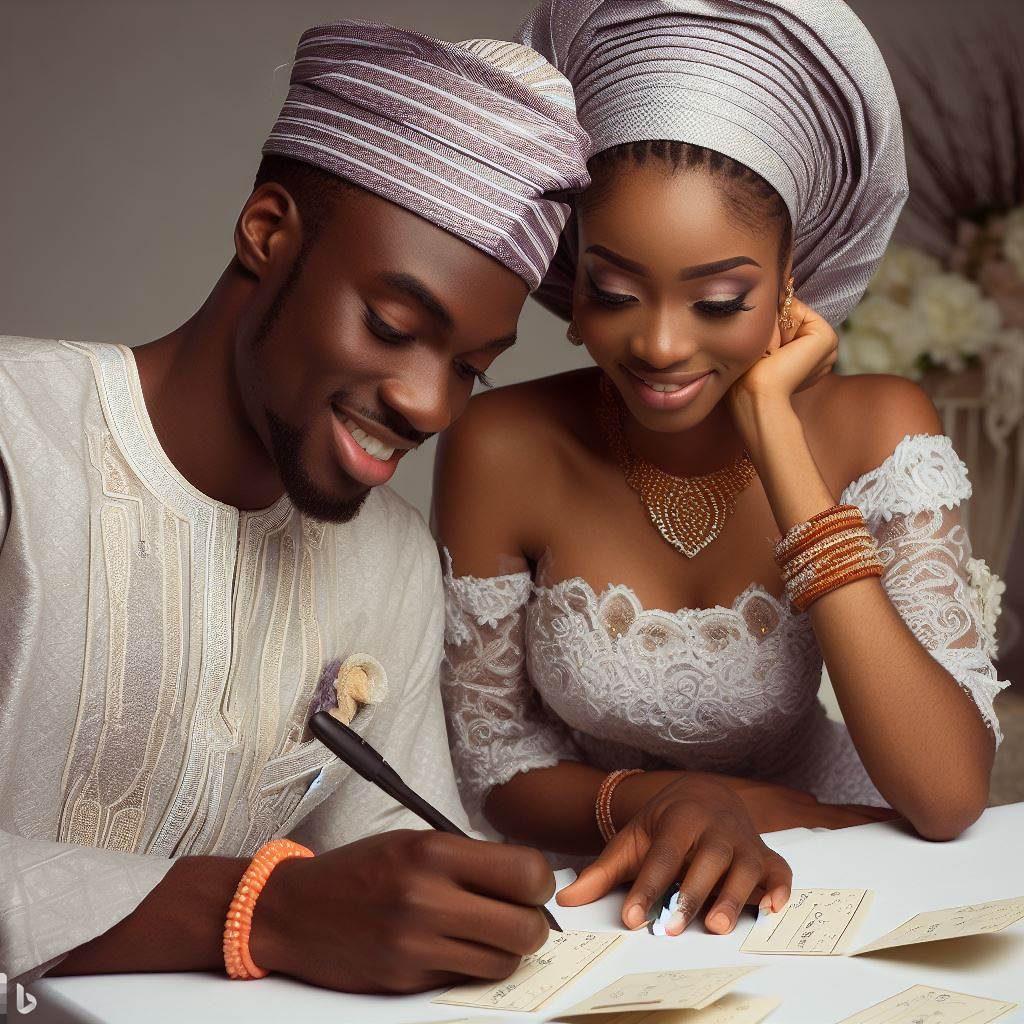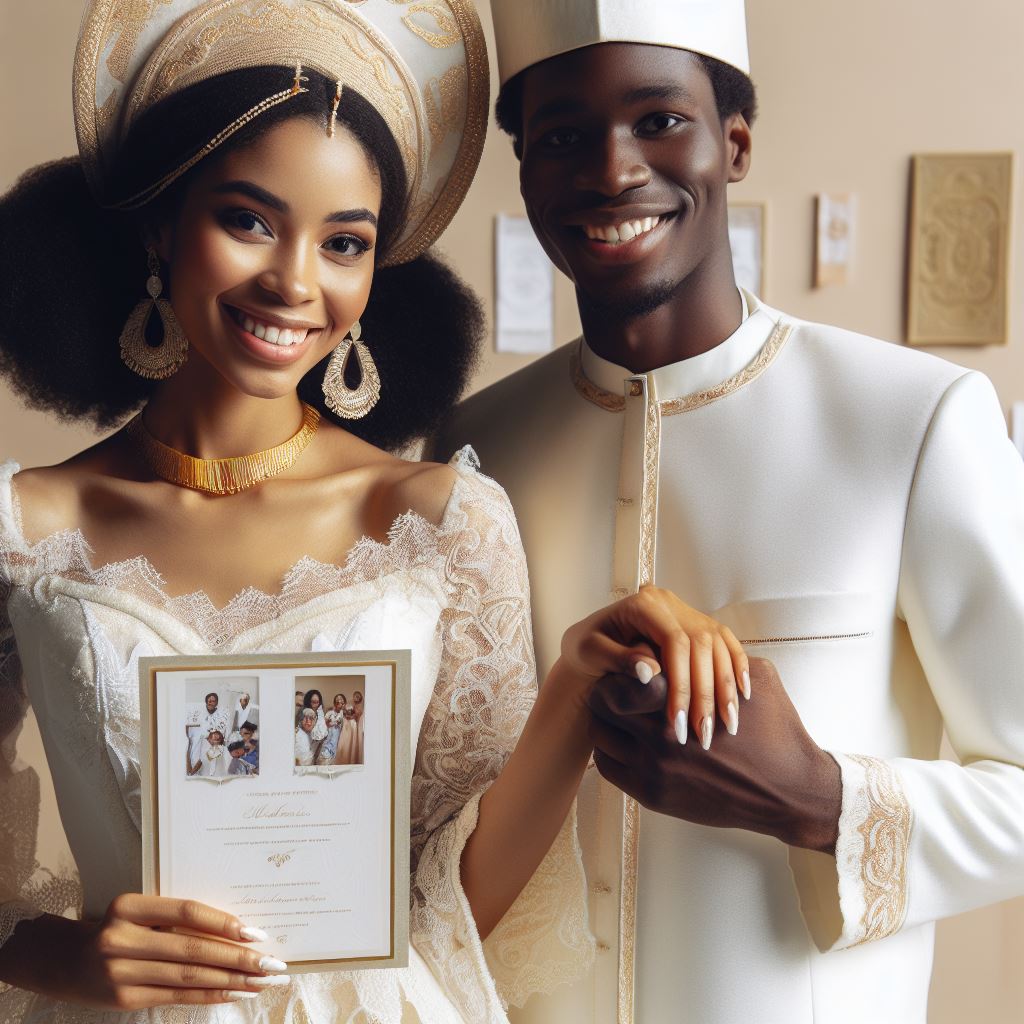Introduction
Traditional Nigerian invite symbols hold a significant cultural value and understanding their meanings is crucial.
This blog post aims to delve into the importance and purpose behind these symbols, shedding light on their rich significance.
Nigeria, a country with diverse cultural heritage, has a deep-rooted tradition of using symbols in various rituals and ceremonies.
Traditional Nigerian invite symbols, specifically, hold great significance in the context of weddings and other celebratory events.
Understanding the meanings behind these symbols is of utmost importance as it helps in appreciating and respecting the cultural traditions of Nigeria.
These symbols are not just random designs or motifs but carry deep messages that reflect values, beliefs, and history of Nigerian communities.
The purpose of this blog post is to explore the hidden meanings and symbolism behind traditional Nigerian invite symbols.
By doing so, readers will gain insight into the cultural fabric of Nigeria and appreciate the significance these symbols hold in various ceremonial events.
In the following sections, we will delve into specific symbols commonly used in Nigerian invitations, deciphering their meanings and unraveling the stories they tell.
Explore the stories behind the elegant Adinkra symbols and intricate geometric patterns, each holding a unique narrative.
Join us on this journey to explore the meaning behind traditional Nigerian invite symbols and gain a deeper appreciation for the cultural richness of Nigeria.
Let’s dive in and unlock the hidden messages behind these beautiful symbols.
Historical Background
A. Brief overview of the history of traditional Nigerian weddings
Traditional Nigerian weddings have a rich history deeply rooted in the country’s diverse cultural heritage.
Various Nigerian ethnic groups have influenced these weddings, which date back centuries.
The customs and traditions associated with Nigerian weddings vary across regions and communities.
B. Significance of invite symbols and their origins
Invite symbols play a crucial role in traditional Nigerian weddings as they convey meaningful messages.
- Ancient traditions gave rise to these symbols, enabling the communication of various aspects of the wedding.
- Each symbol represents a specific message, such as fertility, unity, prosperity, or blessings for the couple.
- Initially, they painted these on invitation cards and subsequently integrated them into other aspects of the wedding decor.
C. Evolution of invite symbols over time
With the passage of time, invite symbols have evolved to reflect the changing trends and preferences.
Modern couples often customize traditional symbols to align with their unique personal styles while still revering these age-old emblems.
Contemporary designs feature a fusion of traditional and modern elements, reflecting the dynamic nature of Nigerian culture.
Electronic invitations have also gained popularity, incorporating digital representations of these symbols in invitations.
Despite these changes, the underlying importance and symbolism associated with invite symbols remain intact.
Read: Nigerian Royal Wedding Invitations: Designing with Elegance
Common Nigerian Invite Symbols
A. Common symbols found on traditional Nigerian wedding invitations
Traditional Nigerian wedding invitations are not just simple pieces of paper requesting the presence of guests.
They are rich in symbolism and deeply rooted in cultural heritage.
Each symbol used on these invitations tells a unique story and holds a significant meaning.
In this section, we will discuss some common symbols found on traditional Nigerian wedding invitations and delve into the meaning behind each symbol.
1. Kola nuts: symbolize hospitality and unity
The first symbol we will explore is the kola nuts. Kola nuts are widely regarded as a symbol of hospitality and unity in Nigerian culture.
These nuts are often presented to guests as a gesture of welcome and respect.
They are also commonly shared during important ceremonies and celebrations, including weddings.
The presence of kola nuts on a wedding invitation signifies the couple’s desire for unity and their willingness to extend warmth and hospitality to their guests.
2. Palm wine calabash: represents abundance and celebration
Another symbol frequently seen on traditional Nigerian wedding invitations is the palm wine calabash.
Palm wine is a popular traditional beverage in Nigeria, and the calabash represents not only abundance but also celebration.
It is believed that sharing palm wine during special occasions brings blessings and joy.
The inclusion of a palm wine calabash on a wedding invitation signifies the couple’s intention to invite their loved ones to share in their joy and celebrate their union.
3. Gele (headgear): signifies the bride’s beauty and elegance
Gele, the traditional Nigerian headgear, is yet another significant symbol found on wedding invitations.
It is worn by women in Nigeria as a sign of elegance, beauty, and cultural identification.
Choosing to showcase gele on a wedding invitation emphasizes the bride’s beauty and elegance and serves as a representation of her Nigerian heritage. It also sets the tone for a grand and vibrant celebration.
4. Groom’s traditional attire: reflects his cultural identity and heritage
The groom’s traditional attire is another symbol that holds great importance on Nigerian wedding invitations.
The groom’s attire reflects his cultural identity and heritage. It is a way for him to honor his roots and showcase his pride in his Nigerian background.
Moreover, By featuring the groom’s traditional attire on the invitation, the couple invites their guests to witness and partake in their cultural traditions and heritage.
In fact, traditional Nigerian wedding invitations go beyond the purpose of inviting guests.
They serve as a reflection of the couple’s values, traditions, and cultural heritage.
Symbols such as kola nuts, palm wine calabashes, gele, and the groom’s traditional attire carry deep meanings and convey messages of unity, abundance, beauty, and cultural pride.
These symbols set the stage for a wedding celebration filled with warmth, joy, and rich cultural traditions.
Read: Exploring Digital E-vites for the Modern Nigerian Wedding
Symbolism of Colors and Patterns
A. The symbolism behind specific colors and patterns used on invitations
- Red symbolizes love, passion, and fertility. It is often used to represent celebrations of love and marriage.
- Gold represents wealth, prosperity, and royalty. It signifies luxury and abundance in Nigerian culture.
- Green signifies hope, growth, and the natural beauty of Nigeria. It is often associated with agriculture and the country’s lush landscapes.
B. Common color choices and their meanings
- Red and gold are frequently used together to create a regal and vibrant aesthetic. This combination symbolizes love, wealth, and prosperity.
- Blue is another popular color choice, symbolizing peace, harmony, and spirituality. It is often seen in religious ceremonies and events.
- White represents purity, innocence, and spirituality. It is commonly used in wedding invitations as a symbol of the couple’s clean slate and new beginning.
- Black is associated with mystery, power, and elegance. It is often used in formal events or occasions that require a sophisticated atmosphere.
C. The cultural significance of patterns, such as Ankara or Adire
In Nigerian culture, patterns hold great importance and feature prominently in traditional clothing and even invitations.
Two notable patterns are Ankara and Adire.
Ankara is a vibrant and colorful fabric that originated from the Yoruba tribe.
It features bold and intricate patterns, often depicting African motifs and symbols.
Ankara patterns are used on invitations to represent cultural pride and heritage.
Adire is a traditional Nigerian hand-dyed fabric that uses a resist dyeing technique.
This technique employs wax or starch to resist dye, forming intricate patterns.
Adire patterns symbolize creativity, craftsmanship, and storytelling. Incorporating Adire patterns on invitations adds a touch of cultural significance and uniqueness.
The use of colors and patterns on Nigerian invitations goes beyond aesthetics.
They hold deep cultural meanings and act as a form of communication.
By understanding the symbolism behind specific colors and patterns, one can appreciate the rich cultural heritage and traditions of Nigeria.
In essence, the symbolism of colors and patterns on traditional Nigerian invitations is an important aspect of the country’s cultural identity.
Red, gold, green, and other color choices represent various emotions and concepts, while patterns like Ankara and Adire hold cultural significance.
These elements come together to create visually stunning invitations that convey not only important event details but also the cultural pride and heritage of Nigeria.
Read: Where to Get the Best Deals on Invites in Nigeria
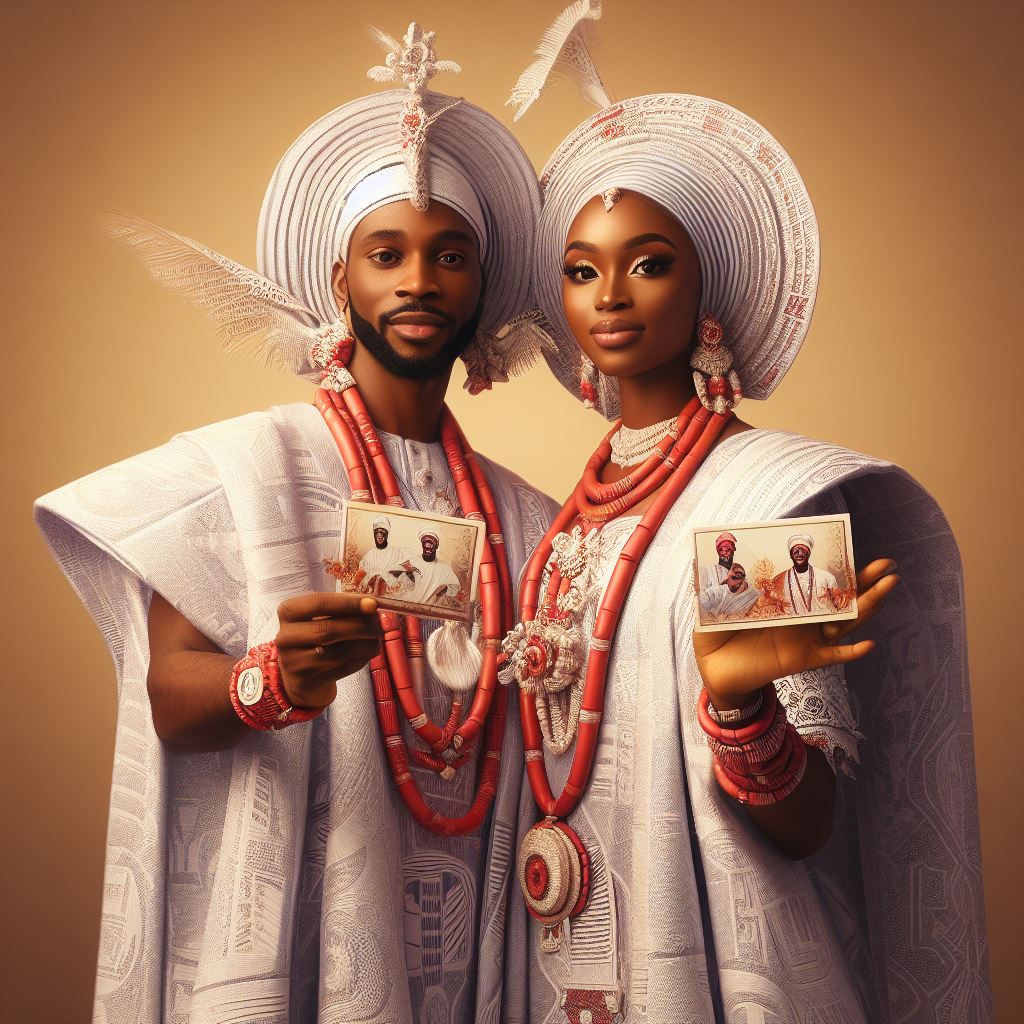
Regional Variations
A. The regional variations of invite symbols across Nigeria
Nigerian invite symbols vary across different regions of the country.
Each ethnic group incorporates their unique symbols and cultural elements into the invitations.
These regional variations add a distinct flavor and meaning to the traditional Nigerian invite symbols.
B. How different ethnic groups incorporate their unique symbols
In the Yoruba culture, invite symbols often incorporate the “adire” symbol and vibrant colors.
The adire symbol represents the unique tie-dye fabric made by Yoruba artisans.
It is a symbol of creativity, craftsmanship, and cultural heritage.
Indigo, purple, and yellow, with their vibrant hues, symbolize joy, celebration, and prosperity.
On the other hand, the Igbo people include the “oko ro” symbol in their invitations.
The oko ro symbol represents wealth and happiness.
Frequently portrayed as an exquisitely adorned vessel brimming with gold coins and jewelry.
The presence of this symbol on the invitation signifies the importance of prosperity and blessings for the event.
In Hausa culture, invite symbols often feature intricate henna designs and Arabic calligraphy.
During traditional weddings, intricate henna designs adorn the hands and feet of the bride and groom.
These designs symbolize beauty, auspiciousness, and protection.
Hausa invitations often feature Arabic calligraphy, infusing elegance and cultural importance.
C. Examples of specific symbols used in different regions
1. Yoruba: Adire symbol and vibrant colors
The adire symbol represents the tie-dye fabric made by Yoruba artisans, symbolizing craftsmanship and cultural heritage.
Vibrant colors like indigo, purple, and yellow signify joy, celebration, and prosperity.
2. Igbo: Oko ro symbol for wealth and happiness
The oko ro symbol depicts a beautifully decorated pot filled with gold coins and jewelry, representing prosperity and blessings.
3. Hausa: Intricate henna designs and Arabic calligraphy
Henna designs symbolize beauty, auspiciousness, and protection, while Arabic calligraphy adds elegance and cultural significance to the invitations.
These symbols reflect the rich diversity of Nigerian culture and the importance placed on tradition and symbolism in weddings and other celebratory events.
Read: A Guide to Invitation Etiquette for Nigerian Weddings
Find Out More: Marriage Ring Etiquette: What Every Nigerian Should Know
Modern Influences and Adaptations
How modern influences have impacted the traditional Nigerian invite symbols
Modern influences have greatly impacted the traditional Nigerian invite symbols, bringing new elements into play.
A. How couples incorporate personalization and modern elements
Couples today are incorporating personalization and modern elements into their wedding invitations.
This allows them to create a unique representation of their love and story.
B. The role of technology in designing and distributing wedding invitations
Technology plays a significant role in the designing and distributing of wedding invitations.
With the advent of digital platforms, couples can now create innovative and interactive invites.
They can add personalized photos, videos, and even virtual reality experiences to their invitations.
Technology also allows for quick and efficient distribution of wedding invitations.
Gone are the days of handwritten and personally delivered invites to each guest.
Couples can now simply send an email, text message, or even create a wedding website with all the necessary information.
This saves time and cost, and ensures that all guests receive the invitation in a timely manner.
Furthermore, technology has made it possible for couples to track RSVPs and manage guest lists easily.
It allows them to stay organized and plan their guest count more accurately.
Along with modernization, the internet has also opened up a global marketplace for wedding invitations.
Couples now have the option to choose from a wide variety of designs, colors, and styles from around the world.
They can order customized invitations online, eliminating the need for traditional stationery stores.
This gives couples more freedom to express their unique style and personality in their wedding invitations.
In brief, the influence of modernization has revolutionized the traditional Nigerian invite symbols.
Gain More Insights: The Beauty of Commitment: Analyzing Nigerian Vows
Conclusion
Understanding the meaning behind traditional Nigerian invite symbols is crucial.
These symbols hold immense cultural significance and symbolism.
It is important for readers to appreciate and embrace these symbols in their own weddings as a way to honor and respect the Nigerian culture.
By incorporating these symbols, they can add a unique and meaningful touch to their special day.

